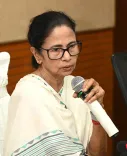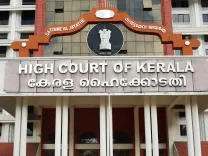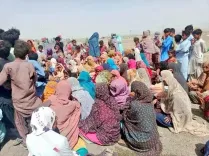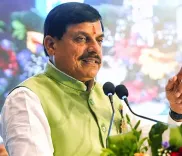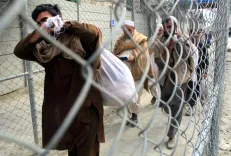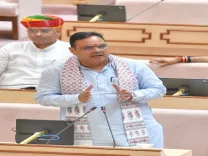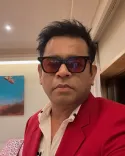Mohan Bhagwat's Message on Dharma in Gujarat Reinforces RSS Activities in Tribal Regions
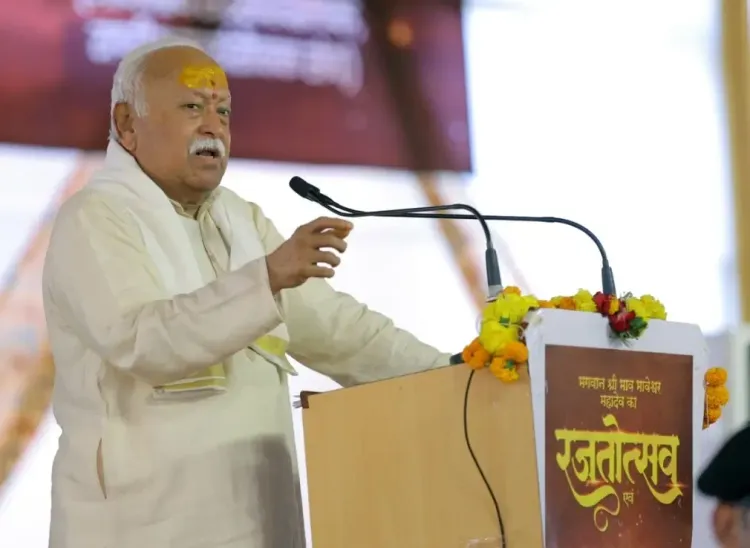
Synopsis
Key Takeaways
- Mohan Bhagwat delivered a significant message on dharma in Barumal.
- The RSS has a long-standing presence in Gujarat, with thousands of shakhas.
- It engages in various social initiatives, including education and disaster relief.
- The RSS's operations are often viewed through a political lens, despite its claim of cultural focus.
- The organization emphasizes grassroots connections and community-building.
Ahmedabad, April 13 (NationPress) When Rashtriya Swayamsevak Sangh (RSS) chief Mohan Bhagwat took the stage in Barumal, a quaint village in Gujarat's Valsad district, on April 12, it transcended mere ceremonial significance. Clad in his characteristic white kurta-pajama and black cap, Bhagwat addressed an enthusiastic crowd during the silver jubilee celebration of the Bhav Bhaveshwar Mahadev Temple.
His message was clear: the ethical framework of India must steadfastly uphold dharma. "People should not alter their faith due to greed or fear," Bhagwat stated.
"Only dharma can guide all towards happiness," he emphasized. Bhagwat’s visit subtly highlighted the ongoing and transformative role the RSS has undertaken in Gujarat.
Founded in 1925 by Dr K.B. Hedgewar in Nagpur, the RSS established roots in Gujarat during the 1940s. However, it was during the 1960s and '70s that the organization began expanding its shakhas -- daily volunteer gatherings -- in towns such as Rajkot, Bhavnagar, and Ahmedabad. By the time the Emergency was invoked in 1975, Gujarat had evolved into a crucial hub in the RSS network. Underground pamphleteering, youth mobilization, and protection for political dissenters against the Indira Gandhi administration were supported by these shakhas. Quietly, consistently, and with fierce loyalty to the ideology of cultural nationalism, the RSS presence in Gujarat was burgeoning.
Currently, the Sangh boasts thousands of shakhas throughout the state, functioning not only as an ideological training ground but also as a social lifeline -- providing relief during floods in Surat, assisting earthquake survivors in Kutch, and initiating educational programs in tribal regions. Despite its contentious political affiliations, primarily through its ideological offspring, the Bharatiya Janata Party (BJP), the RSS in Gujarat often claims to be a cultural organization. Nevertheless, its influence permeates politics, education, tribal welfare, and even business sectors. Bhagwat’s recent visit to Dharampur exemplifies this. The area is predominantly tribal and has witnessed an uptick in RSS activities over the past two decades.
From operating Ekal Vidyalayas (single-teacher schools) to advocating cow protection and Ayurveda, the RSS’s presence in tribal hinterlands is expanding. One RSS pracharak (full-time volunteer) from Surat, who preferred to remain unnamed, remarked, "We strive to fortify society from within. Politics may reap benefits, but our mission is broader." While Dr Hedgewar laid the groundwork, it was his successor, M.S. Golwalkar (Guruji), who fortified the organizational strength of the RSS. In Gujarat, the Sangh’s local leadership has often featured some of the state's most prominent figures.
Prime Minister Narendra Modi began his journey as an RSS 'pracharak', dedicating years to traveling across Gujarat as a full-time volunteer before moving into mainstream politics with the BJP. Others, such as Pravin Togadia (former VHP leader), Gordhan Zadafia, and K.N. Govindacharya, have also emerged from the RSS ecosystem in the state, each advancing the core ideology in various ways.
The RSS’s journey has not been without criticism. Its initiatives in tribal regions have faced skepticism from Christian missionary organizations, who accuse the Sangh of ghar wapsi (reconversion) efforts.
Critics assert that the cultural outreach often intertwines with religious pressure. However, the RSS seldom responds publicly. It relies on grassroots connections, personal relationships, and long-term engagement -- a strategy focused less on immediate outcomes and more on shaping generational perspectives.
The average shakha in Gujarat commences at dawn. Children and young men gather in open spaces, engaging in traditional games, cultivating self-discipline, and discussing national pride. There are no membership cards, no promotional materials; everything spreads through word-of-mouth, peer interactions, and is deeply ingrained in local culture. In Bhavnagar, local shakha members recently organized a week-long youth camp focused on disaster preparedness and traditional Indian values. During the Covid pandemic, the RSS facilitated blood donation drives. These actions rarely make headlines but represent the daily realities that foster the Sangh’s reservoir of goodwill.
Today, Bhagwat’s statements in Barumal might resonate beyond mere spiritual insight. They serve as a reminder to the state, and perhaps the nation, that the RSS remains unwavering in its objectives -- silent, strategic, and expansive. In Gujarat, where politics and culture frequently converge, the Sangh’s presence is not merely a remnant of the past. It is a dynamic, evolving institution with a grassroots approach that few can match.
“The RSS resembles a banyan tree,” a senior swayamsevak in Valsad noted. “Its roots run deep, and its shade is extensive. You might not witness growth daily, but it never ceases.”

